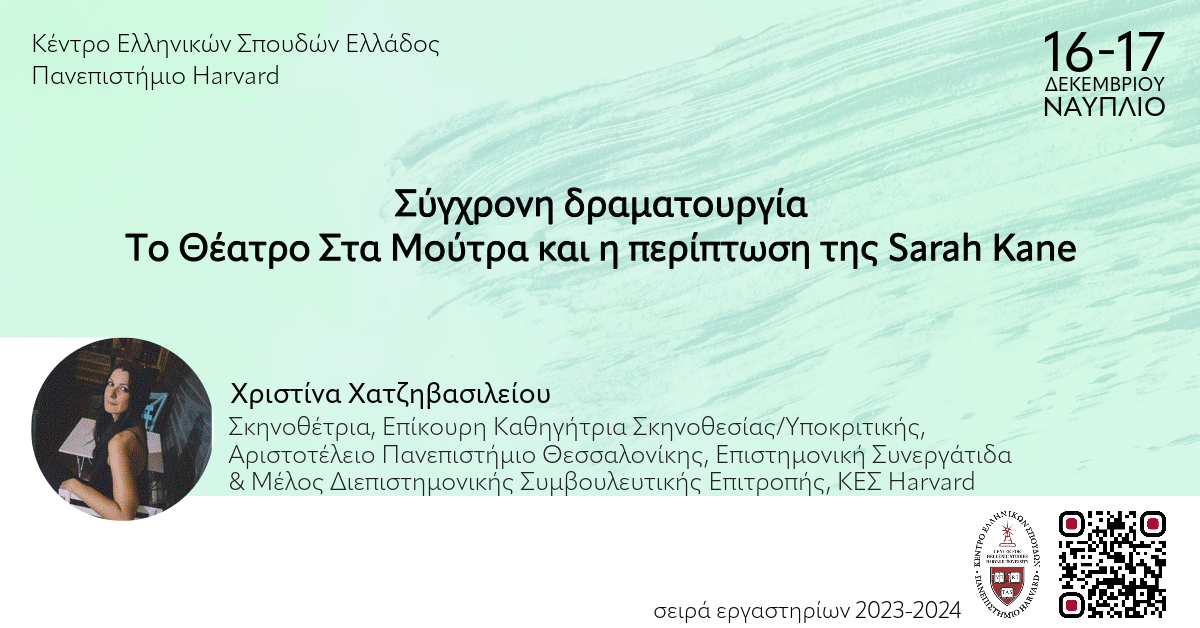- Full title: Contemporary Dramaturgy: In-yer-face Theatre and the Case of Sarah Kane
- Dates: December 16-17, 2023, 11 am-3 pm
- Location: Nafplio, Greece
- Organized by: CHS Greece
- Open to: All (up to 18 positions)
- Application period: November 6-26, 2023
- Academic Coordination: Christina Chatzivasileiou (Stage Director, Assistant Professor of Acting and Stage Direction at the School of Drama, Faculty of Fine Arts, Aristotle University of Thessaloniki, Associate and Member of the CHS Greece Interdisciplinary Advisory Committee in Theater Studies)
- Activity Administration: Matina Goga (CHS Greece)
About the workshop
Overview
CHS Greece as part of its annual workshop series that aim to support Hellenic Studies and the broader field of Humanities, and to offer intergenerational, interdisciplinary, lifelong learning opportunities to the public, announces the workshop "Contemporary Dramaturgy: In-yer-face Theatre and the Case of Sarah Kane."
In this workshop, the academic coordinator and the participants will delve into the world of contemporary dramaturgy and explore how the major political and social events of the 1990s left a profound impact on the writing career of a generation.
Rooted in the unresolved cycle of violence present in ancient tragedy, as well as influenced by Artaud's Theatre of Cruelty, Barker's Theatre of Catastrophe, and the literary beat generation, the in-yer-face theatre emerged in the 1990s. It presented itself as bold, provocative, and unsympathetic, offering a raw and shocking portrayal of the radical socio-political changes that reshaped our understanding of the world.
The term "anger," initially woven into the fabric of John Osborn's Look Back in Anger, became a defining element in the dramatic history of the UK from 1956 to the late 1990s. It ultimately found its most iconic expression in Sarah Kane's Blasted (1995), inadvertently becoming the logo of "in-yer-face" movement, a presence that has captivated critical imagination ever since. Alongside Kane, a generation of young writers who came of age during the era of Margaret Thatcher's rule (1979-1990) embraced and even coined the term "shock aesthetics."
At just 24 years old, Kane crafted a self-indulgent piece characterized by its brutal and unflinching portrayal of scenes, with the war in Bosnia serving as its invisible dramatic backdrop. This play blasted the complacency of the British public, sparking widespread outrage.
But what were the specific elements of Kane's writing that provoked such a strong reaction? What were the dramatic motifs that shattered previously established forms? In-Yer-Face Theatre marked the emergence of a new anthropogeography of non-places, serving as symptoms of supermodernity, and ushering in a dystopian chapter in the history of theater.
Thematic areas & Workshop structure
The approach to the workshop’s topic will be structured around the following thematic axes:
Day one
-
Review
- Brief reference to the socio-political history of the 1990s
- The impact of censorship and Margaret Thatcher's term in Britain as factors shaping in-yer-face theatre
- Anger as a key term and milestone drama works
-
The in-yer-face theatre
- What is the in-yer-face theatre?
- Etymology and attempts at definition
- Influences from ancient tragedy
- Representative authors and plays
- Socio-political transformations and implications
- Symptoms of supermodernity in dramaturgy: places and non-places
Day two
- In-yer-face theatre: the case of Sarah Kane:
- An autobiography
- Influences
- Criticism
- Blasted: extensive analysis of the play through tools of contemporary anthropology and coupling with socio-political events.
-
Reading/presenting scenes in groups:
- There will be a distribution of scenes from the play to small groups who will be asked to do a short rehearsal in a time allotted and read/present the scenes in front of the rest of the workshop's groups to make clear how much more resonant the discourse of this kind of theater becomes when produced in public, and what emotions it evokes. Does it really hit us like a punch in our faces?
During the workshop meetings, the academic coordinator will introduce the above topics, and participants are invited to take an active part in the group's discussions, work in groups, and, after a short rehearsal, to read/present scenes from the play to the entire group. In addition, ten days before the workshop, participants will receive a digital copy of the play Blasted, which is recommended that they have read beforehand, in order to be able to actively engage in the discussion and get the most out of the workshop.
Learn more about the workshop on Contemporary Dramaturgy and the application process (in Greek).


